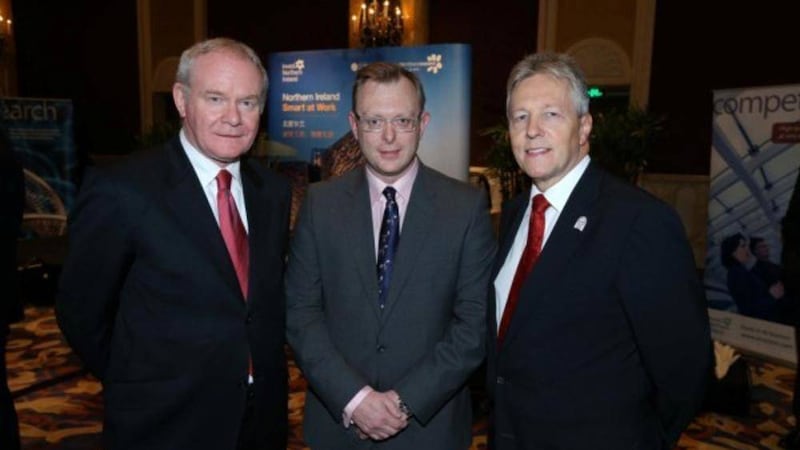The story of the £7.2m payment into an offshore bank account, "reportedly earmarked for a Northern Ireland politician” or party has sent political shockwaves around the north.
The waters are muddied by claims, counter claims and half truths.
We know the payment was made by Brown Rudnick, a US law firm, who represented the US investment vehicle Cerberus.
Cerabus bought up more than 850 Nama-held properties for around €1.5 bn - a writedown of more than €3bn of taxpayers’ money.
Belfast law firm Tughans provided local counsel on the Project Eagle deal, as it was codenamed, and the eyewatering £7.2 million was, it said, for this work.
The money, unbeknownst to the rest of Tughans partnership, was diverted into an Isle of Man account by its managing partner, Ian Coulter, who then made an abrupt exit from the firm when the money transfer was discovered.
Tughans provided Northern Ireland legal advice, but Coulter alonside one of Nama's Northern Ireland Advisory Committee members, and others had been involved in trying to sell the loan book as a single portfolio sale, and it remains unclear exactly what the £7.2m fee paid by Brown Rudnick on behalf of Cerberus was for.
The BBC claim that at least £6 million of this money was intended to facilitate payments to deal-makers other than Tughans.
The Irish News revealed that there are up to 30 hours of secret-taped recordings that could expose how the £7.2m offshore fund was set up last year as a pay-off allegedly earmarked for facilitators linked to and including a Northern Irish politician.
In short, there are still questions that remain unanswered as the net closes in on the fixers and facilitators behind the £7.2m payments...
To ascertain whether the public have been misled with regards the Nama-asset sale to Cerabus we need to know:
- what work exactly was carried out by Tughans to justify the huge fee of £7.2million paid to Ian Coulter's offshore account? And who was the money intended for?
Tughans claim that the £7.2m "retrieved" by them represents their "professional fees".
The Irish News understands that the Tughans' work represented approximately £1.2 million and the senior partners of Tughans anticipated collecting a significant portion of that £1.2 million in a extraordinary partnership profit allocation. The rest of the money was earmarked for facilitators and fixers, one of which is a politician.
It is understood that £7.2m represents the biggest single payment that Tughans have ever received on any transaction. We can be fairly confident that it was not for 'time on the clock' i.e. billable hours that law firms document and charge clients for.
Certainly it is understood that the Law Society, which has been investigating the circumstances surrounding Ian Coulters departure, has been unable to ascertain what exact work the £7.2m payment was for.
Legal sources have expressed surprise that a local counsel role, such as that being undertaken by Tughans, would have generated £7.2m in legal fees, even for a deal of the size of the Project Eagle loan book.
- why has no "suspicious activity report" been filed by Tughans under the Proceeds of Crime Act 2002?
Tughan's maintain the Law Society of Northern Ireland are investigating, and it awaits the outcome of that investigation before deciding on what further action they may take.
For a professional firm it is an offence not to report any suspicious aspect of a transaction they work on unless it is covered by confidentiality obligations owed to their client. The PSNI have said nothing has ever been reported to it regarding the claims, and "as such there is no investigation".
Cushnahan, one of Nama's Northern Ireland Advisory Committee members who Tughans disclosed had a self-contained office in the same building occupied by the law firm, could help shed some light over what the proposed fee arrangements were for.
Brian Rowntree, another member of NAMA's Northern Ireland advisory committee at the time of the Cerabus deal, old the BBC: "It would be fair to say that the information that I witnessed and I heard in Nama, offered commercial opportunity and I would have thought that Nama wanted to protect that data, they wanted to make sure that data was not in any way exploited by any individual in Nama or associated with Nama."
He strongly denied any link to the allegations and defended his role at Nama. He told The Irish News: "There is nothing that questioned my integrity in relation to my dealing with Nama."
- Why are the PSNI not investigating the allegations?
The PSNI say they have not received any report into the claims, but why are they waiting?
As revealed by the Irish News, tape recordings are understood to exist which may expose further evidence of the involvement of facilitators and fixers.
The PSNI should be investigating this matter thoroughly, as they did with the Boston tapes.
What this latest scandal does, especially the allegation that its goal may have been to financially benefit an individual or party, is make a comprehensive investigation a matter of urgency.








